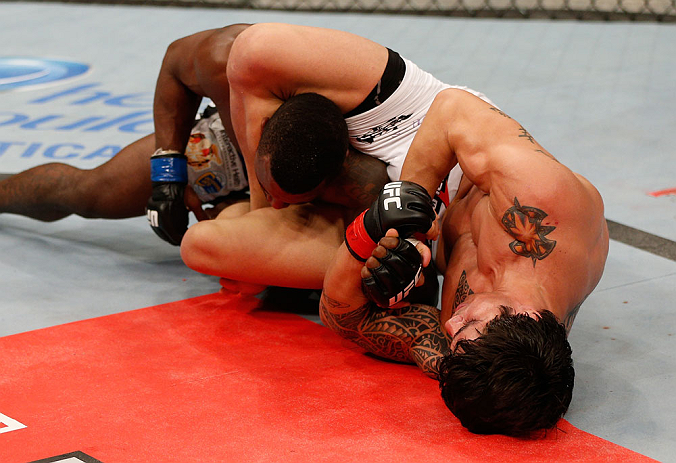Immerse in the captivating world of Mixed Martial Arts (MMA), where the fusion of different fighting styles creates a thrilling spectacle of strength, agility, and technique. This comprehensive piece delves into one of MMA’s core disciplines – Brazilian Jiu-Jitsu. An integral part of this dynamic sport, Jiu-Jitsu’s influence on the landscape of MMA is undeniable and continues to evolve.
Discover how the power of Jiu-Jitsu gets unleashed in the MMA arena. This martial art’s principles and techniques have not just shaped the sport but also dominated events like UFC. The intricate maneuvers, strategic groundwork, and the triumph of technique over brute strength encapsulate Jiu-Jitsu’s fundamental role in MMA.
This piece traces the journey of Jiu-Jitsu as a foundational discipline in MMA. It highlights its evolution and dominance, emphasizing its inherent potential that fighters tap into during matches. The intricacies of Jiu-Jitsu strategies and the tactical advantage they provide in MMA bouts are explored in depth.
Uncover the stories of MMA fighters who have harnessed the power of Jiu-Jitsu to rise to prominence. Their experiences and tactics showcase how this martial art discipline equips them with an edge over their adversaries, influencing their fighting style and their success.
As this exploration unfolds, the piece further sheds light on the future trajectory of Jiu-Jitsu within MMA. It elucidates how Jiu-Jitsu’s continued evolution is set to revolutionize the way MMA bouts are fought. Through this lens, gain a broader understanding of the interplay between MMA and Jiu-Jitsu, and how this symbiotic relationship is set to redefine the sport.

The Emergence of Jiu-Jitsu in MMA
The foundational discipline of Jiu-Jitsu in Mixed Martial Arts (MMA) represents an evolution that has dramatically shifted the dynamics within the fighting ring.
Jiu-Jitsu, an art that originated from the Samurai of feudal Japan, was designed to neutralize opponents through leverage and technique, as opposed to brute force. This principle of leverage is a fundamental key to the effectiveness of Jiu-Jitsu in MMA.
The early emergence of Jiu-Jitsu in MMA can be traced back to events such as the Ultimate Fighting Championship (UFC), where fighters like Royce Gracie showcased the power of this martial art. Royce, representing the smaller fighters, was able to triumph over larger, stronger opponents with his superior technique.
Integration of Jiu-Jitsu into MMA
As the popularity of MMA grew, so did the incorporation of Jiu-Jitsu. Fighters began to see the value in this martial art, understanding that it was essential to diversify their skill set to remain competitive. The techniques used in Jiu-Jitsu, such as ground fighting and submission holds, became crucial tools for fighters.
- Ground fighting: Jiu-Jitsu is renowned for its emphasis on ground fighting. This technique is essential in MMA, where matches can quickly move from standing to the ground.
- Submission holds: Jiu-Jitsu is also known for its array of submission holds. These techniques can incapacitate an opponent, forcing them to submit and thus ending the fight.
Jiu-Jitsu’s Dominance in UFC
The dominance of Jiu-Jitsu in the UFC is evident in the number of champions who have utilized this martial art in their arsenal. Fighters such as Anderson Silva, Demian Maia, and BJ Penn have all demonstrated the power and effectiveness of Jiu-Jitsu in their respective weight classes.

Techniques Adapted from Jiu-Jitsu
There are numerous techniques that fighters have borrowed from Jiu-Jitsu, further showcasing its influence in MMA. These include the Rear Naked Choke, the Armbar, and the Guillotine Choke. Each technique requires a high level of skill and strategic implementation, but can result in a decisive victory if executed correctly.
- Rear Naked Choke: This submission hold is one of the most common and effective techniques used in MMA. The fighter applying the hold seeks to cut off oxygen to their opponent, forcing them to submit or risk losing consciousness.
- Armbar: An Armbar is a joint lock that hyperextends the opponent’s elbow, causing immense pain and potentially causing them to tap out.
- Guillotine Choke: This choke hold is often applied when the opponent attempts a takedown. It involves the fighter applying pressure to their opponent’s neck, effectively choking them and forcing them to submit.
The Future of Jiu-Jitsu in MMA
The future of Jiu-Jitsu in MMA seems promising, as fighters continue to incorporate and develop this martial art within their training regimens. The evolution of Jiu-Jitsu in MMA is a testament to the adaptability and effectiveness of this foundational discipline, ensuring its dominance in events like UFC for years to come.
To truly grasp the power of Jiu-Jitsu in MMA, it’s essential to recognize the importance of the key principles it brings to the fighting arena – strategy, technique, and leverage. The tactical mind of a Jiu-Jitsu practitioner can often outmaneuver raw power, demonstrating the martial art’s profound influence and continued relevance in the world of MMA.
With continuous innovation and evolution, Jiu-Jitsu will undoubtedly continue to shape the face of MMA, cementing its place as a powerful and foundational discipline within this popular sport.
Conclusão
In conclusion, the power of Jiu-Jitsu in MMA cannot be understated. This martial art, with its roots in the Samurai era of Japan, has evolved and adapted to become a dominant force in the MMA world. Its incorporation and subsequent dominance in events like UFC is a testament to its effectiveness and adaptability. Fighters have utilized key principles of Jiu-Jitsu, such as technique, strategy, and leverage, to triumph over stronger opponents. This is exemplified by renowned fighters like Royce Gracie, Anderson Silva, and Demian Maia who showcased the potency of this martial art. The prominence of Jiu-Jitsu techniques such as the Rear Naked Choke, the Armbar, and the Guillotine Choke in MMA fights further demonstrates its influence. The future of Jiu-Jitsu in MMA appears bright, as fighters continuously incorporate this discipline into their training regimens. The continued evolution of Jiu-Jitsu ensures its relevance and dominance in the MMA arena. With continuous innovation, Jiu-Jitsu will undoubtedly retain its position as a foundational discipline in the popular sport of MMA.
